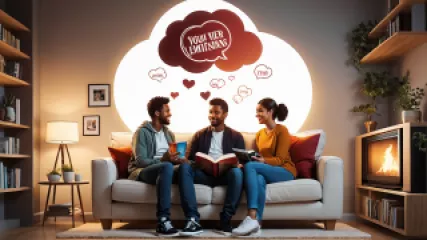Applying Book and Movie Lessons to Improve Relationship Communication
Communication is a crucial aspect of any relationship. It allows partners to understand each other, express their needs and desires, and work together towards a common goal. However, effective communication can be challenging at times, leading to misunderstandings and conflicts.
Fortunately, there are various resources and techniques available to improve relationship communication. One unique and unconventional approach is to draw inspiration from books and movies. By exploring the lessons and insights provided by fictional stories, we can gain valuable perspectives and apply them to our own relationships.
Why Use Books and Movies?
Books and movies have the power to transport us to different worlds, introduce us to diverse characters, and immerse us in compelling narratives. They offer a window into the human experience and provide us with valuable insights into various aspects of life, including relationships.
When we engage with stories through books or movies, we can observe different communication styles, conflict resolution techniques, and emotional dynamics between characters. We can learn from their successes and failures, gaining a fresh perspective on our own communication habits.
Lessons from Books
Books offer a rich source of wisdom and inspiration when it comes to improving relationship communication. Here are a few examples:
- "The 5 Love Languages" by Gary Chapman: This book explores the idea that individuals have different ways of expressing and receiving love. Understanding your partner's primary love language can significantly enhance communication and emotional connection in your relationship.
- "Nonviolent Communication" by Marshall B. Rosenberg: This book presents a framework for compassionate communication, emphasizing empathy, active listening, and expressing oneself without blame or judgment. Applying the principles of nonviolent communication can foster understanding and harmony in relationships.
- "Men Are from Mars, Women Are from Venus" by John Gray: This classic book highlights the differences in communication styles between men and women and provides strategies for bridging the gap. It offers insights into how to navigate common challenges and create stronger connections.
Lessons from Movies
Movies can also teach us valuable lessons about relationship communication. Here are a few examples:
- "The Break-Up": This film explores the breakdown of a romantic relationship and the challenges faced by the couple in communicating their needs effectively. It emphasizes the importance of active listening, compromise, and understanding each other's perspectives.
- "500 Days of Summer": This movie delves into the complexities of modern dating and the power dynamics that can influence communication. It illustrates the significance of open and honest dialogue, setting boundaries, and managing expectations.
- "Silver Linings Playbook": This film portrays characters dealing with mental health challenges and highlights the importance of empathy and patience in communication. It demonstrates the transformative power of genuine connection and effective emotional expression.
Applying Lessons to Improve Relationship Communication
Once you've gained insights from books or movies, it's essential to apply those lessons to your own relationship. Here are some practical steps you can take:
- Reflect on the lessons: Take time to reflect on the lessons you've learned and consider how they align with your current communication patterns. Identify areas where you can improve and set specific goals.
- Engage in open dialogue: Initiate conversations with your partner about the lessons you've learned. Discuss how you can both apply them to enhance your communication skills and strengthen your relationship.
- Practice active listening: Actively listen to your partner without interrupting or formulating responses in your mind. Validate their feelings and thoughts, demonstrating that you value their perspective.
- Use "I" statements: When expressing your needs or concerns, use "I" statements to avoid sounding accusatory or placing blame. This approach helps create a safe and non-confrontational space for open communication.
- Cultivate empathy: Make an effort to understand your partner's emotions, experiences, and point of view. Practice putting yourself in their shoes to foster empathy and strengthen your connection.
- Seek professional help: If you encounter persistent communication challenges, consider seeking the support of a couples therapist or engaging in online therapy for communication issues. These professionals can provide guidance tailored to your specific needs.
Conclusion
Improving communication in relationships is an ongoing process that requires dedication and effort. By drawing inspiration from books and movies, we can gain valuable insights and learn new ways to enhance our communication skills. Remember to reflect on the lessons, engage in open dialogue, practice active listening, and cultivate empathy. Applying these strategies can lead to more meaningful connections and deeper understanding in your relationship.






